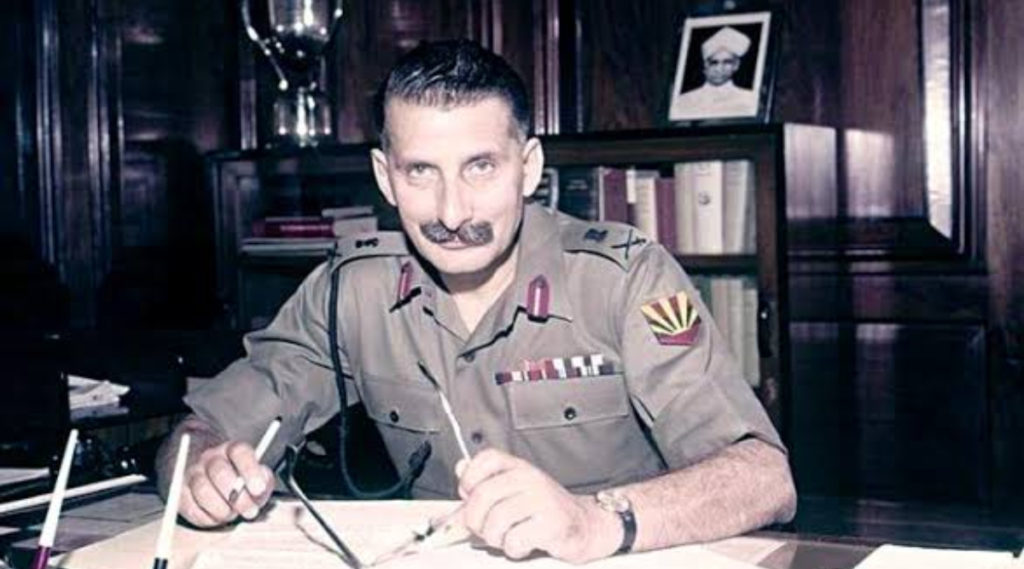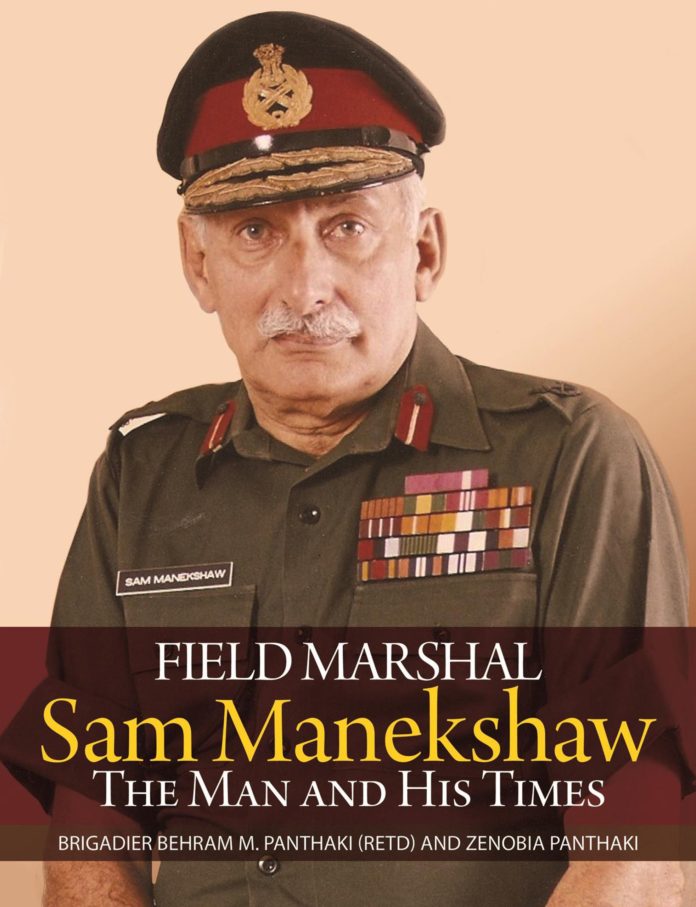This book by the husband and wife team provides a window into the personality of an officer and gentleman, Field Marshal Sam Manekshaw. Brigadier ® Behram Panthaki served as ADC to Sam and Behram and Zanobia had a life long association with Sam and his family. This gives the authors a unique vantage point, they have done an excellent job of introducing the readers to the human side of Sam.
Sam Hormusji Framji Jamshedji Manekshaw was the most popular soldier of India. He passed out from Indian Military Academy (IMA) at Dehra Dun in 1934 and commissioned in elite 4th Battalion of 12th Frontier Force Regiment (4/12 FFR). This battalion went through various reorganizations through its one hundred and fifty years history. It started as 4th Sikh Local Infantry after the First Sikh War in 1846. In 1901, it became the 4th Sikh Infantry and in 1903 became 54th Sikhs. In the 1922 reorganization, it became 4th Battalion of 12th Frontier Force Regiment and in 1947, on partition of India, the battalion was assigned to Pakistan and in the 1957 reorganization it became 6th Frontier Force (FF) Regiment of the Pakistan army. The Battalion is nicknamed ‘Charwanjah’ referring to its old number 54, it has the unique honor that an Indian and a Pakistani army chief belonged to this battalion. The eighth Chief of Army Staff of Indian army Sam Manekshaw (1969-1973) and fifteenth Chief of Army Staff of Pakistan army General ® Raheel Sharif (2013-2016) of Pakistan army were commissioned in charwanjah.
In the Second World War, Sam then a captain was leading Sikh company of 4/12 FFR in Burma. A small group of Japanese soldiers surprised the troops and sneaked into the perimeter of the battalion at night, this caused panic and a number of soldiers bolted from the scene. Sam’s Sikhs firmly stayed in their positions. Sam had threatened them that he will personally distribute ‘bangles’ if any of them moved from their position. Later, in one of the attacks on a Japanese position, Sam was severely wounded when seven bullets of a Japanese machine gun hit him in his stomach. His orderly Sher Singh put Sam on his back and evacuated him to Regimental Aid Post where Regimental Medical Officer (RMO) Captain G. M. Diwan tended to him. Sam was awarded Military Cross (MC). Death was closely lurking around him. When Sam was being treated at a hospital at Pegu, Japanese planes bombed the hospital and Sam’s bed was moved to the lawn. A severely wounded Sam was moved to Mandalay and then to Rangoon. Sam was on the last ship which left Rangoon before the Japanese overran it. The ship was also bombed by Japanese planes but Sam made it to Madras. This association with the battalion during combat and fighting some of the most difficult battles had a lifelong impact on the young man.
Sam had a special affection for the battalion despite it being allotted to rival Pakistan. In 1950s, his battalion mate Brigadier (later Lieutenant General) Atiq-ur-Rahman nick named ‘Turk’ (4/12 FFR) was commanding a brigade in Kohat that was brought to Lahore for internal security duties. Turk and another PIFFER Brigadier (later Lieutenant General) Bakhtiar Rana (commissioned in 6/13 Frontier Force Rifles and now 1 FF of Pakistan army) went to Ferozpur to visit Sam who was commanding 167th Brigade. Old PIFFERS had a great time together reminiscing about their days together. In 1965, Sam was GOC-in-Chief of eastern command and he had another interesting meeting with his paltan mate Major General Fazal Muqeem Khan (4/12 FFR) who was GOC of Dacca based 14th Division. After the 1965 war, a meeting was arranged for the two commanders. Sam landed at Dacca and after a warm and brief welcome told Fazal ‘let’s go home to meet the Begum Sahiba’. Sam and Fazal left leaving their bewildered staff officers to sort out all the mundane tasks of the meeting.

When Sam was army chief, there was a standing order to all the staff, guards and sentries that whenever an ex-serviceman of 4/12 FFR came to the army headquarters, he should be brought to the chief no matter what the chief was doing. In the 1971 war when he was the Indian army chief, he kept an eye on performance of 4/12 FFR (now 6 FF) which was fighting from Pakistan’s side. His staff would notice a certain pride in his eyes when the briefing officer would give some account of 4/12 FFR. He commented to his military assistant ‘I should like to see one of my 8th Gorkha battalions fighting the 4/12 Frontier Force Regiment’. When Major Shabbir Sharif of 6 FF got the highest gallantry award of Nishan-e-Haider fighting from the Pakistan side, Sam wrote to one of his old British Commanding Officer (CO) of 4/12 FFR in England that he was so proud that an officer of ‘his battalion’ got the honor although Sam’s forces were fighting against Pakistan. Another sign of his association was his love for local footwear of North West Frontier Province; Peshawari chaplis. Long after he left the frontier, he preferred Peshawari chaplis when wearing casual dress. He also named one of his dogs PIFFER.
The Book provides details about Sam’s family and personal life in addition to highlights of his professional career. A large number of photographs from the family album, never published before, make it a wonderful pictorial catalogue of evolution of a young cadet through various stages of his life. While looking at the photographs, one cannot ignore one thing and that is whenever Sam is with other people, everyone is laughing. Sam had a great sense of humor and in most of these photographs he is in his usual jovial and naughty mood.
This book is a timely reminder to young officers of Indian and Pakistan armies about a generation of officers of a bygone era. It is a welcome addition to the work done about Indian army officers. This work is different as it provides a window to the human side of Sam. It should be in the library of anyone interested in the Indian army.





